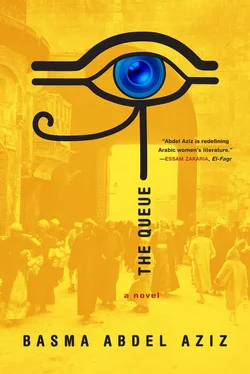Records were subsequently requested from his university and workplace, and examination of the observations recorded therein has established that the symptoms observed in the patient offer an incomplete picture, and thus prevent an accurate diagnosis. In addition to anxiety and irritability, other symptoms include an irrational belief that he can alter reality; a clear tendency to act in a socially unacceptable and unhealthy manner; and a sharp, unfriendly manner when interacting with others .
The first time Tarek read the document, he had to look up the symptoms to fully understand them, as they were well outside his area of expertise. He read it two or three times, and then it dawned on him that all the episodes mentioned in Document No. 4—episodes that, it was said, Yehya had succumbed to on more than one occasion — coincided with particular events. Some had occurred before the Gate appeared, and others shortly afterward. Tarek knew what had happened to Yehya during the first Disgraceful Events, and knew that Yehya had suffered episodes of pain so severe that they left him immobile, but Tarek hadn’t noticed anything like these emotional episodes or other strange symptoms.
Tarek was interested only in matters relevant to his work as a surgeon: whether Yehya had previously undergone surgery, or had a disease that would prevent further operations. He found himself calling for Sabah and asking her if she had noticed any unusual behavior or symptoms in Yehya when he’d been at the hospital, or whether he’d behaved in any way that might have unsettled or bothered her, but she was quick to dismiss the suggestion and seemed surprised by the question.
He returned to the last paragraph, searching for a detail that might lead him to a possible diagnosis, but found nothing. He contemplated the three additional symptoms, trying them on for size himself. It wasn’t hard: Tarek had certainly done a few things that his colleagues had deemed unacceptable, or at least unwise. Once, he had made an honest mistake while assisting on a difficult surgical operation, and they had called him crazy when he actually admitted it to his boss. As for a “belief that he can alter reality,” it was true that when he was younger he’d been certain he could convince other doctors not to skip their shifts and keep to the schedule like he did … or, at least, as he had done until recent months. He realized that he was on the same path as Yehya, and that one of these days he might merit a document just like this one. He turned the page over, burying it among the other papers, and pushed the file to a far corner of his desk.
THE WAY TO THE COFFEE SHOP
Ehab shook Yehya’s hand encouragingly, welcoming him into a relationship of friendship and solidarity, where he would be at Yehya’s disposal. He told Yehya that he was ready to help him any way he could, with anything and at any time. Whether he was in the queue or at the newspaper headquarters, all Yehya had to do was call him. He gave him his phone number and left him with Nagy; he didn’t want to waste time talking when he was sure he could find this Mrs. Alfat, wherever she was. If Yehya was ready to go public with his story, which was sure to spark an uproar, he would be by far the most important person Ehab had met in the queue; he and his bullet were pieces of solid evidence that hadn’t yet been covered up. If Yehya was able to get his permit, it would set a significant precedent; the Gate had never issued anything like it before. But if he failed, he would pay with his life, and no bargaining or compromises would save him. Ehab meant it: he was ready to do anything to help Yehya stay strong until the Gate opened. He and Nagy could take care of anything Yehya couldn’t do himself — any difficult tasks that could cause Yehya’s health to take a turn for the worse. There was no question that the two of them were faster than he was, but he refused to stop coming and going. He kept fighting against it all, even though it was exhausting his ailing body and he desperately needed to rest. Ehab had been interested in Yehya since he first laid eyes on him and his perpetual frown. It didn’t seem to match Yehya’s admirable fighting spirit, but from the time they’d first met in the queue, Ehab didn’t remember ever having seen Yehya smile.
A few days after the Gate released its announcement, Amani called Nagy from the office. She’d been debating what to do, and trying in vain to reach Yehya, and she was so anxious by the time she phoned Nagy that she didn’t even wait for an answer when she asked how he was, and leapt right into her next question:
“Did you hear the message?”
“I heard it.”
“What about Yehya?”
“Yehya heard it, too. We’re looking for the head nurse.”
“I think we really screwed up. We got off to a late start; Yehya should’ve requested the X-ray sooner.”
“We would have run into the same problems either way. That or other problems. Now’s not the time for blame, Amani.”
“ Tayyeb , all right. Listen, I took two days off work, and I’m going to Zephyr Hospital tomorrow or the day after.”
“Call me before you go, Amani, please … or better still, let’s meet up beforehand. We can meet you anywhere near the queue.”
“Fine. Tomorrow at three at the restaurant across from the coffee shop?”
“We’ll see you there.”
“Tell Yehya I say hi. And can you convince him to get a new cell phone? I can’t stand not knowing how to get hold of him.”
Yehya, meanwhile, was rather pleased to be working with Ehab, who wasn’t nearly as nosy as he’d feared. Perhaps he’d been mistaken about him; maybe he’d been overly annoyed by his loud personality, or maybe he’d just lost patience with Ehab’s constant buzzing beside him, the pecking that threatened to bore holes straight through him. Yehya wasn’t sure when Ehab would be back, but he wasn’t worried. A strange mood had taken hold of him recently: the significance of life’s minutiae waned and dwindled before his eyes, and suddenly everything seemed inconsequential.
Standing there in the queue, he toyed with the possibility of freedom; he wanted, even if only in the smallest way, to cast off what he was used to doing so mechanically and to break the tedium of these countless weeks of waiting. He marked his place on the ground, told people nearby that he was leaving, as was customary in the queue, and then decided that for the rest of the day he would no longer do what was expected of him. He woke Nagy up from his nap and told him he wanted to wander through the downtown area of the city for a while. Nagy stood up, wiped his face with his shirtsleeve, passed his fingers through his hair, and looked ready for action. He hadn’t expected Yehya to leave the queue again, not after their last and only excursion, to see Tarek, which had ended in disappointment. They walked side by side, occasionally linking arms, and without a word they headed toward the old coffee shop. It was where they’d often met up in their student days, and they hadn’t been there for years, although they’d heard recent reports that it was almost in ruins after surviving numerous attacks.
A warm breeze blew on their faces from the direction of the coffee shop, but it carried the pungent gas that still lingered in the streets, making their noses run and their eyes sting. The world looked like it had the day they went to see Amani: the ground was crushed, and deep fissures ran through the asphalt, as if creating new streets. Their eyes fell on a scattering of strange, large, multicolored munitions. They didn’t look like anything Yehya and Nagy had ever seen before, and offered no trace of where they might have been manufactured.
Читать дальше











